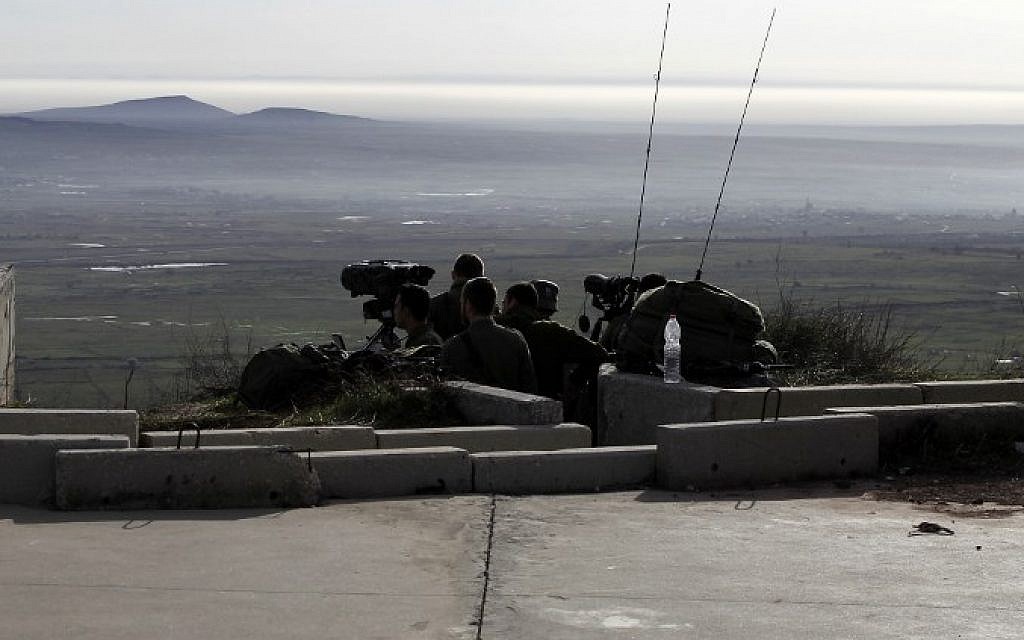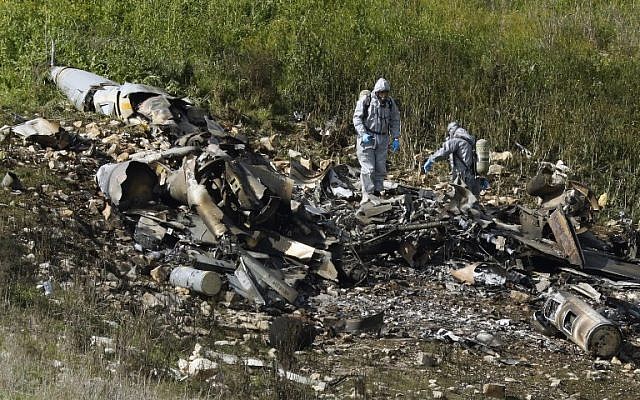Intelligence Ministry chief says Israel will not cease enforcing its red lines, Islamic Republic currently not interested in full-scale war

Israel has long been sounding the alarm over Iran’s effort to entrench itself militarily in Syria, but the pace at which the Islamic Republic has escalated its aggressive behavior is surprising, a senior Israeli intelligence official said Sunday, a day after Iranian-Israeli hostility dramatically stepped up a gear.
“It happened more quickly than people expected,” said Chagai Tzuriel, the director-general of the Intelligence Ministry. “The negative dynamic inherent in the Iranian presence is happening perhaps more quickly than people expected.”
On Saturday, Israel shot down an Iranian drone after it entered Israeli airspace from Syrian territory. The Israeli air force then retaliated against Iranian targets in Syria, but one Israeli fighter jet was downed by Syrian forces on its return to Israel, triggering a second round of Israeli strikes, specifically aimed at Syrian air defenses.
“My view is that what happened yesterday didn’t happen yesterday. It happened a long time ago,” Tzuriel told The Times of Israel in his Jerusalem office. “I should not say, We told you so, but we surely told you so.”
Jerusalem has been warning for at least 18 months of the threat inherent in the Iranian military presence in Syria, he added.
Saturday’s flareup was part of Iran’s ongoing campaign against Israel, though the regime is currently not interested in a full-scale war with the Jewish state, Tzuriel said.
In the aftermath of the incident, Israeli security analysts have been wondering why Iran would escalate tensions at this time by sending a drone over the border. Hitherto, the Iran’s anti-Israel activity played out mostly verbally or through proxies.
Sima Shine, a former deputy director-general at the Strategic Affairs Ministry, said on Sunday that the altercation occurred with the “worst timing,” and was not in the best interest of Tehran’s political leadership. After all, civil unrest continues to simmer on the streets of Iran, and the incident further highlighted the fact that the Islamic Republic invests huge sums in foreign wars, rather than improving its domestic economy.
Tzuriel, who served in the Mossad spy agency for 28 years before taking the helm of the Intelligence Minister, disagreed.

“I don’t think something like that would have been done without sanction from Tehran. All theses things get okayed from people like [senior Revolutionary Guards commander] Qasem Soleimani. I don’t know if they picked up the phone and ordered this particular incident. But I am sure the Iranians are working according to a general directive, which is very aggressive,” he said.
Many pundits consider Saturday’s events a watershed, declaring that the Iranian-Israeli conflict has stepped out of the shadows and will henceforth be fought in the open. But Tzuriel was hesitant to categorize the sending of a drone as a tipping point in Iran’s aggression against Israel.
“It’s a process,” he said. “Was it a very problematic step in what we have assessed would be a general trend that could lead to escalation? Yes, this was a major event. Did they cross more than one red line? Yes, definitely. But I wouldn’t like to give it this headline now. Maybe another action will turn out to have been the tipping point. So I’m cautious.”
Iran’s move should also not be seen as an effort to distract from domestic issues, he said. “This is part of an ongoing directive that has not changed for a while now. The Iranians slowly cross every thin pinkish line, so as not to create the impression of a major infraction. But in retrospect, when we look back, we will have found that they crossed a huge red line. This is exactly what we’re worried about.”
Still busy with domestic unrest and their effort to help their Syrian allies win the civil war, the Iranians are not currently interested in full-fledged war with Israel, Tzuriel surmised. “If anything, it was to show some muscle.
“But they want to slowly but surely encroach on our sovereignty, and get us and everybody else used to them doing these things. And then, one day, you wake up and you see you have in Syria the same situation that you have now in Lebanon, with Hezbollah having established itself there militarily with the sole goal of attacking Israel. This is exactly why we made a point yesterday: No, this gradual approach will not work here — even if it means that our response needs to be quite serious.”

Despite Israel’s severe retaliation against Iranian targets in Syria, Tehran can be expected to “do similar things in the future,” he said.
And despite having lost an F-16, Israel will continue to act every time Iran tries to smuggle weapons or entrench itself in Syria, he said. “My sense is that Israel will not lower its standards in this regard. Every time there is an attempt to cross one of the four red lines, Israel will do what it did and what it needs to do.”
Israel’s four red lines are the transfer of advanced weaponry from Iran to Syria or Lebanon; breaches of Israeli sovereignty; Iran’s attempts to establish military bases in Syria; and Iran building a local facility to manufacture missiles in Lebanon, he said.
“Israel will not let go of these red lines,” Tzuriel said. “We will not let Saturday’s events affect us.”
As reported by The Times of Israel
